You'll supercharge your winter immunity with a potent herbal tea blend of echinacea, elderberry, and ginger. Echinacea stimulates your immune system and fights infections, while elderberry's antiviral properties inhibit viral replication. Ginger adds anti-inflammatory benefits and soothes discomfort from throat to stomach. For an extra boost, consider adding rosehips for vitamin C or cinnamon for its antimicrobial properties. Steep these herbs in hot water for 5-10 minutes to extract their full potential. Remember to start with one cup daily and gradually increase to three for maximum benefits. There's more to discover about crafting the perfect immune-boosting brew.
Benefits of Herbal Tea
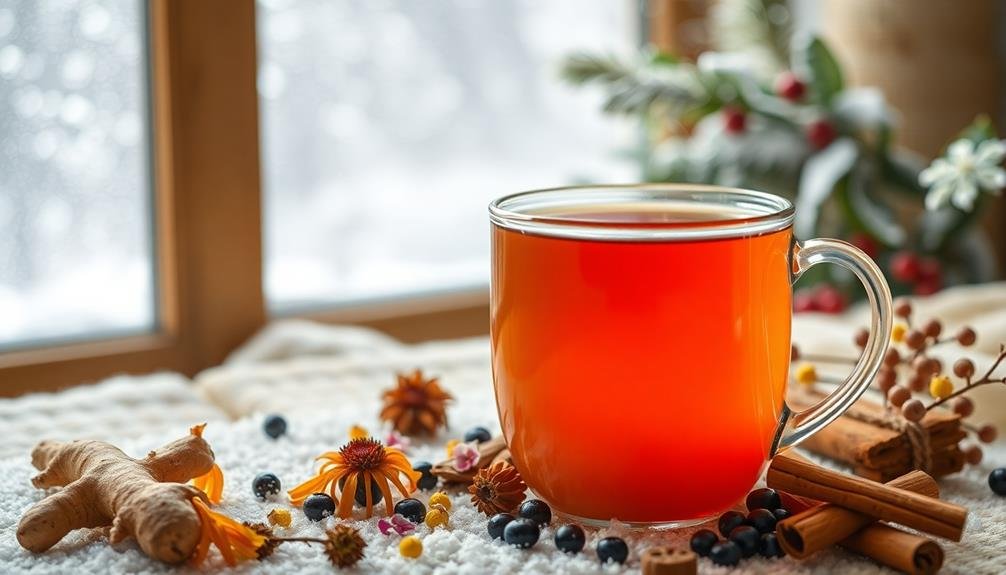
Wellness enthusiasts have long recognized the power of herbal teas. These natural brews offer a wealth of health benefits that can support your overall well-being, especially during the cold winter months.
Herbal teas are packed with antioxidants, which help protect your cells from damage caused by free radicals. They're also known to boost your immune system, helping you ward off common colds and flu.
You'll find that many herbal teas have anti-inflammatory properties, which can ease sore throats and reduce congestion. They're excellent for hydration, too, keeping your body functioning effectively.
Some blends can even improve your digestion and promote better sleep, both vital for maintaining a strong immune system.
Herbal teas are caffeine-free, making them a perfect choice for evening consumption without disrupting your sleep patterns. They're also calorie-free, so you can enjoy them guilt-free.
With a wide variety of flavors available, you're sure to find a blend that suits your taste preferences while delivering numerous health benefits. Incorporating herbal teas into your daily routine can be an easy and enjoyable way to support your winter immunity.
Key Immune-Boosting Ingredients
What ingredients should you look for in an immunity-boosting herbal tea blend? Several key herbs and botanicals can greatly enhance your body's defense mechanisms during the winter months.
Echinacea is a powerhouse herb that stimulates your immune system and helps fight off infections. It's often combined with elderberry, which is rich in antioxidants and has antiviral properties.
Ginger is another essential ingredient, known for its anti-inflammatory effects and ability to soothe sore throats.
Don't overlook the importance of vitamin C-rich herbs like rosehips and hibiscus. These not only boost your immunity but also add a pleasant tartness to your tea.
Turmeric, with its active compound curcumin, offers potent anti-inflammatory and antioxidant benefits.
Look for blends that include adaptogenic herbs like astragalus or reishi mushroom. These help your body adapt to stress and support overall immune function.
Licorice root can be beneficial too, as it has antiviral properties and helps soothe respiratory issues.
Lastly, consider teas with lemon balm or holy basil. These herbs have calming properties that can help reduce stress, which is essential for maintaining a strong immune system during winter.
Echinacea: Nature's Defender
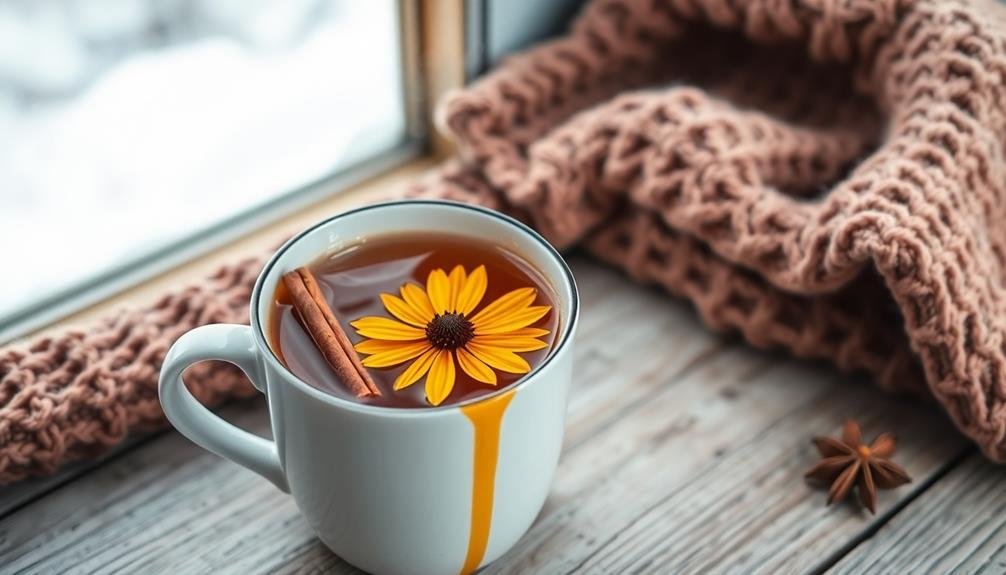
Echinacea, often called the purple coneflower, stands out as one of nature's most potent immune boosters. This herb has been used for centuries to ward off colds and flu, and modern research supports its effectiveness.
When you're brewing your immunity-boosting tea, you'll want to include echinacea for its powerful properties. Echinacea works by stimulating your immune system, helping your body fight off infections more efficiently. It's particularly effective when taken at the first sign of illness, potentially shortening the duration and severity of your symptoms.
You'll find echinacea in many forms, but for tea, dried leaves and roots are ideal.
Here's why you should include echinacea in your winter immunity blend:
- It increases the production of white blood cells, your body's natural defenders
- Echinacea contains antioxidants that protect your cells from oxidative stress
- It may help reduce inflammation, supporting overall health
When brewing your tea, steep echinacea for about 10 minutes to extract its beneficial compounds fully. You can combine it with other immune-boosting herbs like elderberry or ginger for a thorough winter wellness tea.
Elderberry: Antiviral Powerhouse
Elderberry's natural flu-fighting properties make it a powerful ally in your winter wellness arsenal.
You'll benefit from its rich antioxidant content, which helps neutralize harmful free radicals in your body.
Natural Flu-Fighting Properties
Harnessing the power of nature's medicine cabinet, elderberry stands out as a potent antiviral agent in our winter immunity blend. Its natural flu-fighting properties make it an essential component in your defense against seasonal illnesses. Elderberry's effectiveness lies in its ability to inhibit viral replication, effectively shortening the duration and severity of flu symptoms.
When you incorporate elderberry into your herbal tea blend, you're tapping into centuries of traditional wisdom backed by modern scientific research. Studies have shown that elderberry extract can reduce flu symptoms by up to four days compared to placebo groups.
Here's how elderberry fights the flu:
- Blocks viral proteins, preventing the virus from entering healthy cells
- Stimulates the immune system, enhancing your body's natural defenses
- Provides antioxidants that reduce inflammation and support overall health
Don't underestimate the power of this dark purple berry. By including elderberry in your winter immunity tea blend, you're giving your body a natural, potent ally in the fight against flu viruses.
Remember to consult with a healthcare professional before adding any new herbal supplements to your routine, especially if you're pregnant, nursing, or taking medications.
Rich in Antioxidants
Beyond its antiviral properties, elderberry packs a powerful punch of antioxidants, making it a true superfood in our winter immunity blend. You'll find that elderberries are rich in flavonoids, particularly anthocyanins, which give the berries their deep purple color. These compounds act as potent antioxidants, helping to neutralize harmful free radicals in your body.
When you consume elderberry tea, you're not just fighting off viruses; you're also protecting your cells from oxidative stress. This stress can weaken your immune system and make you more susceptible to illnesses. The antioxidants in elderberry work to strengthen your body's defenses, reducing inflammation and supporting overall health.
What's more, elderberry's antioxidant profile includes vitamin C, a well-known immune booster. This vitamin enhances the production and function of white blood cells, which are essential for fighting infections.
Immune System Support
A cornerstone of our winter immunity blend, elderberry stands out as a potent antiviral agent. You'll find this dark purple berry packed with compounds that directly combat various strains of influenza.
It's not just about fighting existing infections; elderberry also strengthens your body's defenses, making it harder for viruses to take hold in the first place.
When you sip this tea, you're giving your immune system a powerful boost. Elderberry works by:
- Inhibiting viral replication, preventing the spread of infection
- Stimulating the production of cytokines, which help regulate immune responses
- Enhancing the function of T-cells, key players in your body's defense mechanism
But elderberry isn't working alone in this blend. It's complemented by other immune-boosting herbs like echinacea and astragalus.
Together, they create a synergistic effect, amplifying each other's benefits. You're not just drinking a tasty beverage; you're arming your body with nature's most effective tools against winter ailments.
Ginger: Warming and Soothing
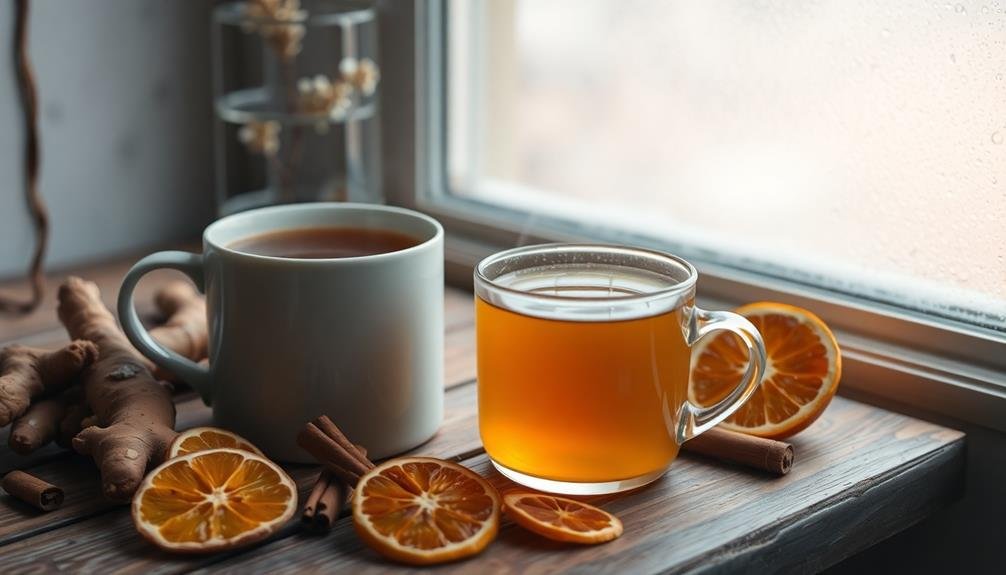
Ginger, a potent root with centuries of medicinal use, stands out as a key ingredient in winter immunity blends. Its warming properties can help you combat the chills of winter while boosting your body's natural defenses.
When you sip on ginger tea, you'll experience a soothing sensation that travels from your throat to your stomach, potentially easing any discomfort you might be feeling.
This powerful root contains gingerols and shogaols, compounds known for their anti-inflammatory and antioxidant effects. These substances can help reduce inflammation in your body and protect your cells from damage caused by free radicals.
Ginger's ability to stimulate circulation may also contribute to its immunity-boosting properties, as improved blood flow can help distribute immune cells throughout your body more effectively.
You'll find that adding ginger to your herbal tea blend not only enhances its flavor but also provides a natural way to support your respiratory system. It can help clear congestion and soothe a sore throat, making it an excellent addition to your winter wellness routine.
Rosehips: Vitamin C Source
While ginger brings warmth to your winter immunity blend, rosehips pack a powerful punch of vitamin C. These small, red fruits of the rose plant are a natural and potent source of this essential vitamin, containing up to 20 times more vitamin C than oranges.
You'll find that adding rosehips to your herbal tea blend not only boosts your immune system but also provides a slightly tart and fruity flavor.
Rosehips offer several benefits for your winter wellness:
- Antioxidant properties: They're rich in flavonoids and polyphenols, which help protect your cells from damage caused by free radicals.
- Anti-inflammatory effects: The compounds in rosehips can help reduce inflammation throughout your body, potentially easing joint pain and stiffness.
- Skin health support: The high vitamin C content promotes collagen production, which can improve skin elasticity and reduce the appearance of fine lines.
When preparing your herbal tea blend, use dried rosehips or rosehip powder. Steep them in hot water for about 10 minutes to extract the maximum benefits.
You can combine rosehips with other immune-boosting herbs like elderberry or echinacea for a thorough winter wellness tea.
Cinnamon: Antioxidant-Rich Spice
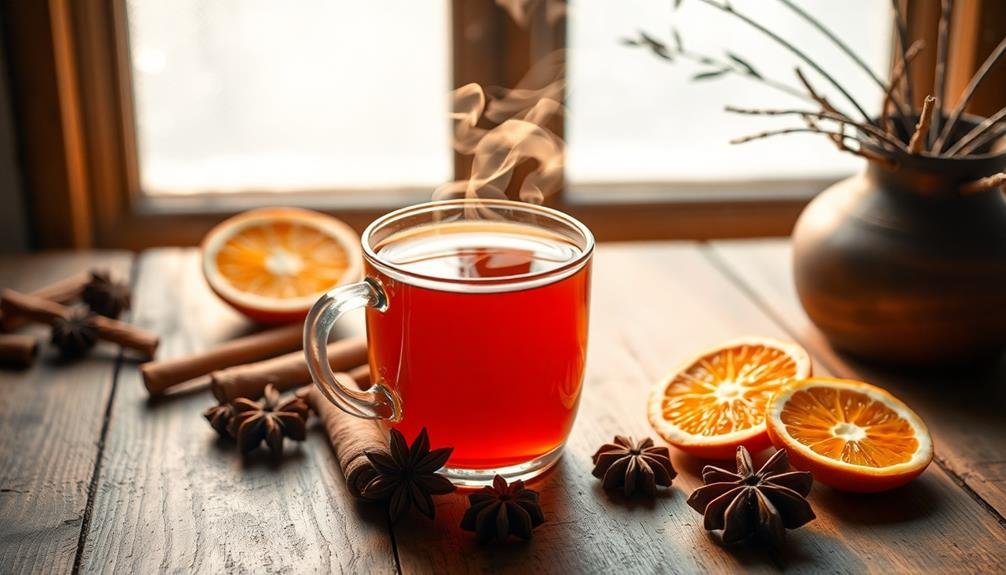
Along with its aromatic warmth, cinnamon brings a potent dose of antioxidants to your winter immunity blend. This spice contains polyphenols, particularly proanthocyanidins and cinnamaldehyde, which combat oxidative stress and inflammation in your body. These compounds help protect your cells from damage caused by free radicals, potentially reducing your risk of chronic diseases.
Cinnamon's antimicrobial properties make it a valuable addition to your winter tea. It can help fight off harmful bacteria and fungi, supporting your immune system's efforts to keep you healthy during cold and flu season. The spice may also aid in managing blood sugar levels, which is essential for maintaining overall health and immunity.
When brewing your immunity-boosting tea, add a cinnamon stick or a quarter teaspoon of ground cinnamon to your cup. Let it steep for 5-10 minutes to fully extract its beneficial compounds. You'll not only enjoy the comforting flavor but also reap the health benefits of this powerful spice.
Lemon Balm: Calming Support
Lemon balm offers you more than just a pleasant aroma in your winter tea blend.
You'll benefit from its stress-reducing properties, which can help bolster your immune system during the colder months.
This calming herb also acts as a powerful ally in fighting off colds and flu, making it an essential component of your immunity-boosting herbal arsenal.
Stress-Reducing Herbal Properties
During the cold winter months, managing stress becomes essential for maintaining a robust immune system. Lemon balm, a key ingredient in our winter immunity herbal tea blend, offers powerful stress-reducing properties that can help you stay calm and balanced. This aromatic herb has been used for centuries to soothe anxiety and promote relaxation.
When you incorporate lemon balm into your daily routine, you'll experience several benefits:
- Reduced cortisol levels: Lemon balm helps lower your body's stress hormone, cortisol, which can weaken your immune system when elevated for extended periods.
- Improved sleep quality: By calming your mind and body, lemon balm can help you achieve more restful sleep, vital for immune function.
- Enhanced mood: The herb's natural compounds can boost your overall mood, helping you stay positive during the dreary winter months.
Lemon balm's stress-reducing effects are attributed to its high content of rosmarinic acid and other beneficial compounds.
These substances interact with your body's GABA receptors, promoting a sense of calm and well-being. By including lemon balm in your winter tea blend, you're giving your body a natural tool to combat stress and support your immune system.
Cold and Flu Fighter
Beyond its stress-reducing properties, lemon balm plays an essential role in fighting colds and flu. This versatile herb contains antiviral compounds that can help combat common winter ailments. When you're feeling under the weather, lemon balm tea can provide relief from symptoms and support your immune system.
Lemon balm's natural antiviral properties make it effective against various strains of influenza and the common cold virus. It can help reduce the severity and duration of these illnesses. The herb also possesses anti-inflammatory qualities, which can ease sore throats and reduce congestion.
You'll benefit from lemon balm's ability to promote restful sleep, vital for recovery during illness. Its mild sedative effects can help you relax and get the rest you need to heal. Additionally, lemon balm supports your digestive system, which is often compromised during colds and flu.
To maximize lemon balm's cold and flu-fighting potential, combine it with other immune-boosting herbs like echinacea or elderberry. This powerful blend will provide extensive support for your winter immunity, helping you stay healthy throughout the season.
Brewing the Perfect Blend
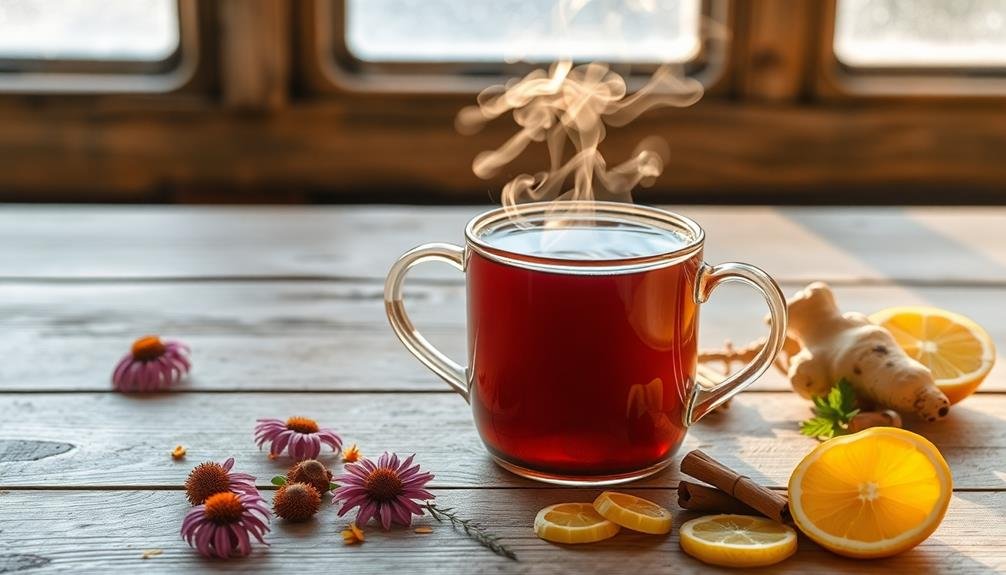
Creating the ideal herbal tea blend for winter immunity is only half the battle; brewing it properly is equally essential. To extract the maximum benefits from your herbal tea, you'll need to pay attention to water temperature, steeping time, and storage methods.
Start with fresh, cold water and bring it to just below boiling point. Different herbs require varying temperatures, but generally, 190-200°F (88-93°C) works well for most blends. Pour the hot water over your herbs and cover the cup or teapot to trap the steam and volatile oils.
Steeping time varies depending on the herbs used, but a good rule of thumb is 5-10 minutes for most blends. Taste your tea periodically to find your preferred strength. Once brewed, strain the herbs and enjoy your tea while it's still warm.
Here are three tips to enhance your herbal tea experience:
- Use loose herbs instead of tea bags for better flavor and potency.
- Experiment with adding a squeeze of lemon or a teaspoon of raw honey for extra immune-boosting properties.
- Store your herbal tea blend in an airtight container away from light and moisture to preserve its potency.
Customizing Your Tea Blend
When crafting your personalized winter immunity tea blend, start by selecting your base herbs.
You'll want to choose herbs known for their immune-boosting properties, such as echinacea, elderberry, or astragalus.
To enhance the flavor profile of your blend, consider adding natural flavor enhancers like cinnamon, ginger, or lemon peel.
Choosing Base Herbs
For a robust winter immunity tea blend, start by selecting your base herbs. These form the foundation of your tea, providing the primary flavor and health benefits. Choose herbs known for their immune-boosting properties and ability to support your body during cold months. Consider herbs like echinacea, elderberry, or astragalus, which have long been used in traditional medicine to strengthen the immune system.
When choosing your base herbs, keep these factors in mind:
- Flavor profile: Select herbs that complement each other and create a pleasant taste. For example, combine the earthy notes of echinacea with the sweetness of elderberry.
- Potency: Opt for high-quality, organic herbs to guarantee maximum potency and effectiveness.
- Availability: Choose herbs that are easily accessible in your area or can be ordered online from reputable sources.
Remember to research each herb's properties and potential interactions with medications or health conditions. It's always wise to consult with a healthcare professional before incorporating new herbs into your diet, especially if you have existing health concerns or are pregnant.
Adding Flavor Enhancers
Once you've established your base herbs, it's time to enhance the flavor of your winter immunity tea blend. Adding complementary ingredients can improve taste and provide additional health benefits. Reflect on incorporating aromatic spices, sweet herbs, or citrus elements to create a more enjoyable and well-rounded tea experience.
Here are some popular flavor enhancers to reflect on:
| Ingredient | Flavor Profile | Health Benefits |
|---|---|---|
| Cinnamon | Warm, sweet | Anti-inflammatory |
| Ginger | Spicy, zesty | Digestive aid |
| Lemon peel | Citrusy, tangy | Vitamin C boost |
When adding these enhancers, start with small amounts and adjust to your taste preferences. You can experiment with different combinations to find your perfect blend. Remember that some flavors may overpower others, so balance is key. For a sweeter taste, you might add a touch of honey or stevia after brewing.
Don't be afraid to get creative with your flavor choices. You can even incorporate dried fruits like apple or berries for a fruity twist. Just keep in mind that the primary goal is to support your immune system during the winter months.
Storage and Shelf Life
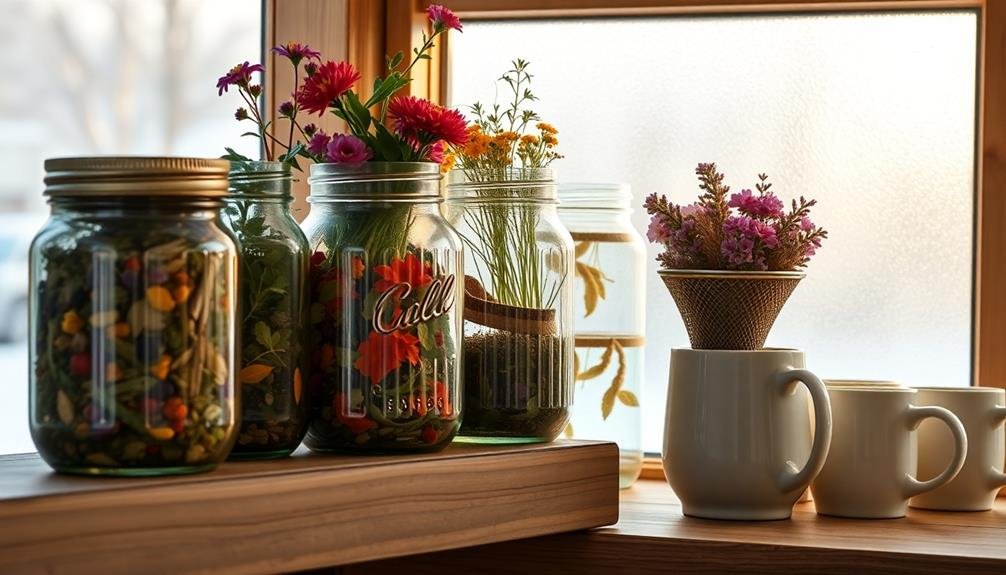
How you store your herbal tea blend can greatly impact its shelf life and potency. To preserve the flavor and medicinal properties of your winter immunity blend, you'll need to protect it from light, heat, and moisture.
Store your tea in an airtight container, preferably made of dark glass or opaque material, to shield it from sunlight. Keep it in a cool, dry place like a pantry or cupboard, away from heat sources and humidity.
For ideal freshness and effectiveness, follow these guidelines:
- Label your tea blend with the date of preparation and a list of ingredients
- Use the blend within 6 months for the best flavor and potency
- Check for signs of spoilage, such as mold or unusual odors, before use
While dried herbs generally have a long shelf life, some ingredients may lose their potency faster than others.
Flowers and delicate leaves tend to degrade more quickly, while roots and seeds can maintain their properties for longer. If you've added any fresh ingredients to your blend, consume it within a week and store it in the refrigerator.
Daily Consumption Recommendations
Moderation is key when incorporating your winter immunity herbal tea blend into your daily routine. While this herbal tea can provide numerous health benefits, it's crucial to consume it responsibly.
Start by drinking one cup in the morning and another in the evening, preferably after meals. You shouldn't exceed three cups per day, as overconsumption may lead to unwanted side effects. If you're new to herbal teas, begin with one cup daily and gradually increase your intake. Pay attention to how your body responds and adjust accordingly.
It's best to drink your herbal tea blend warm, as heat can enhance the release of beneficial compounds. Steep the tea for 5-7 minutes to extract ideal flavors and nutrients. You can add a teaspoon of honey for added sweetness and immune-boosting properties.
Remember that this herbal tea blend isn't a replacement for a balanced diet or medical treatment. If you're pregnant, nursing, or taking medications, consult your healthcare provider before incorporating this tea into your routine.
Potential Side Effects
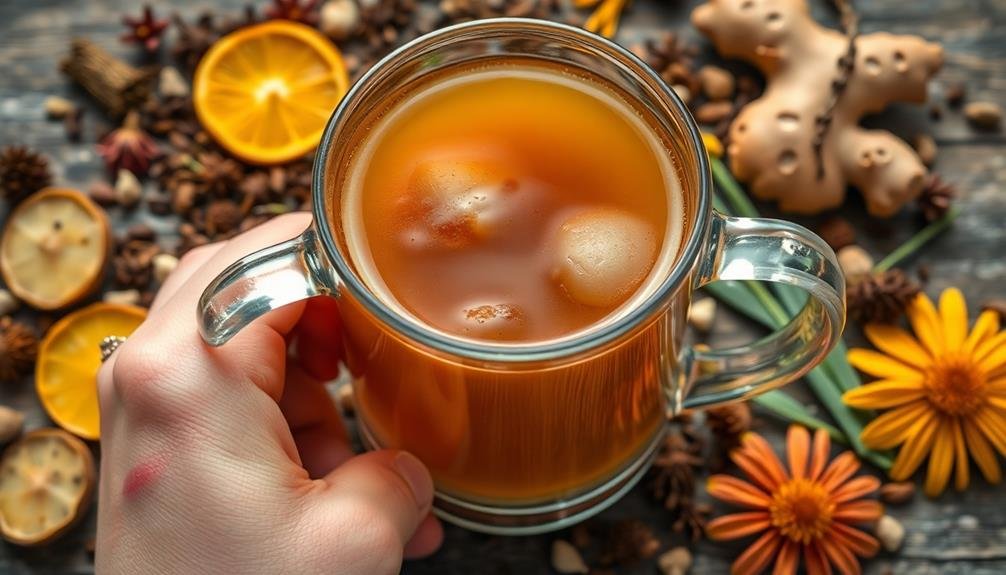
While generally safe for most people, the winter immunity herbal tea blend can potentially cause side effects in some individuals.
It's important to be aware of these possible reactions and consult with a healthcare professional if you have any concerns.
Some potential side effects you might experience include:
- Digestive discomfort: Ingredients like ginger or peppermint may cause mild stomach upset, bloating, or heartburn in sensitive individuals.
- Allergic reactions: If you're allergic to any of the herbs in the blend, you could experience symptoms such as itching, hives, or difficulty breathing.
- Interactions with medications: Certain herbs may interact with prescription medications, potentially altering their effectiveness or causing adverse reactions.
If you're pregnant, nursing, or have a pre-existing medical condition, it's vital to speak with your doctor before incorporating this herbal tea blend into your routine.
Additionally, if you notice any unusual symptoms after drinking the tea, discontinue use and seek medical advice.
Remember that while herbal remedies can be beneficial, they're not without risks.
Always listen to your body and use caution when trying new supplements or herbal blends.
Frequently Asked Questions
Can Pregnant Women Safely Consume Immune-Boosting Herbal Tea Blends?
You should be cautious with herbal teas during pregnancy. While some are safe, others can pose risks. It's best to consult your doctor before consuming any immune-boosting blends to guarantee they're appropriate for your condition.
How Do Herbal Tea Blends Compare to Over-The-Counter Immune Supplements?
You'll find herbal tea blends are a more natural alternative to over-the-counter supplements. They're often gentler on your system and can provide additional benefits like hydration and relaxation. However, supplements may offer more concentrated doses of specific immune-boosting compounds.
Are There Any Drug Interactions With Immune-Boosting Herbal Tea Blends?
You should be cautious with immune-boosting herbal teas. They can interact with medications, especially blood thinners, antidepressants, and diabetes drugs. Always consult your doctor before adding new herbal blends to your routine if you're taking medications.
Can Children Drink These Herbal Tea Blends for Immunity?
You should be cautious giving herbal teas to children. While some are safe, others may cause side effects. It's best to consult your pediatrician before introducing any herbal teas to your child's diet for immunity support.
How Long Does It Take to Notice the Immune-Boosting Effects?
You'll likely notice immune-boosting effects within a few weeks of regular consumption. However, everyone's body responds differently. It's best to incorporate these teas into your daily routine and maintain a healthy lifestyle for ideal results.
In Summary
You've now got the knowledge to create your own immunity-boosting herbal tea blend. Remember to experiment with different combinations of echinacea, elderberry, and ginger to find your perfect mix. Don't forget to store your blend properly and enjoy it daily for maximum benefits. While these teas can be powerful allies in winter wellness, be mindful of potential side effects and consult your doctor if you have any concerns. Stay warm and healthy!

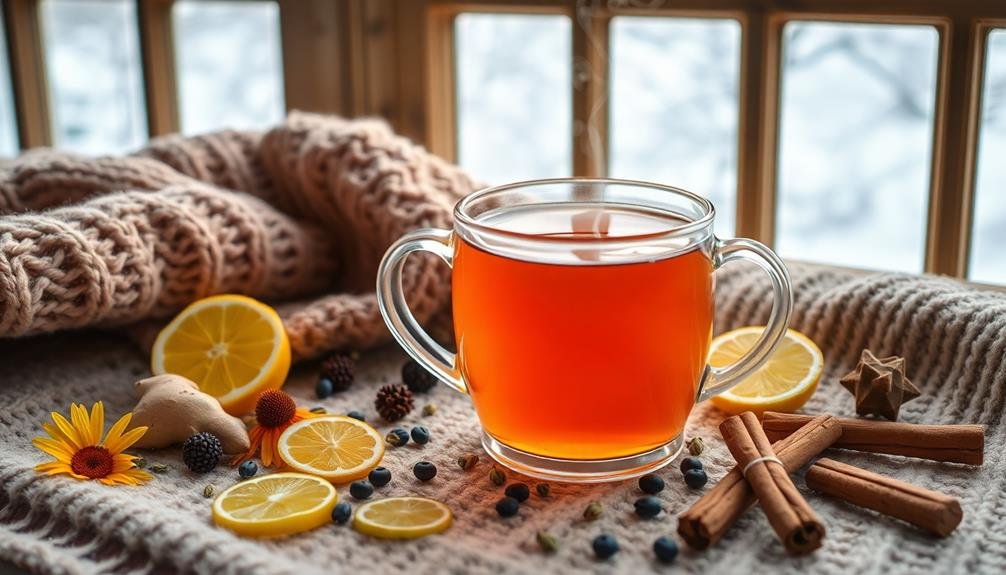


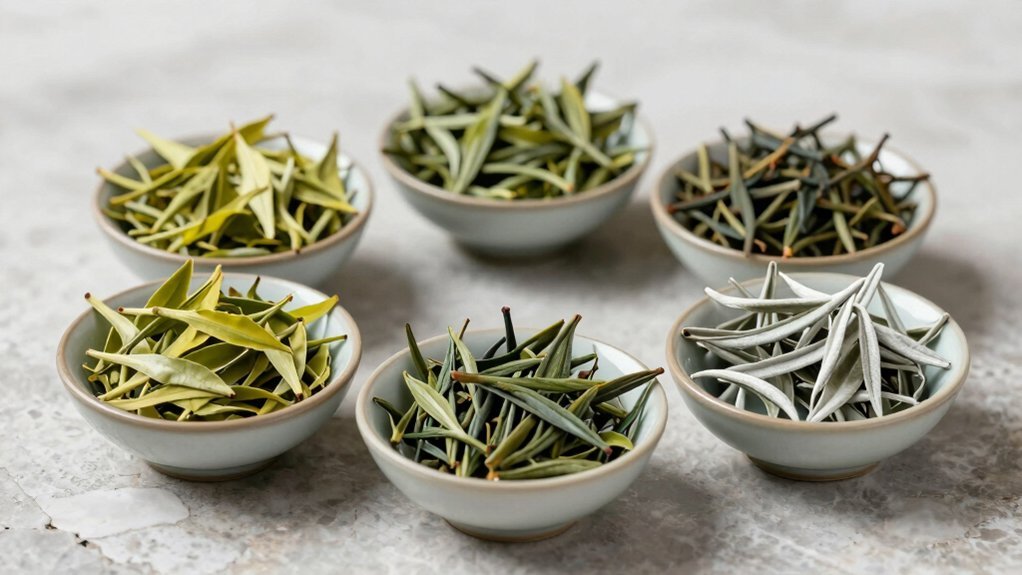
Leave a Reply